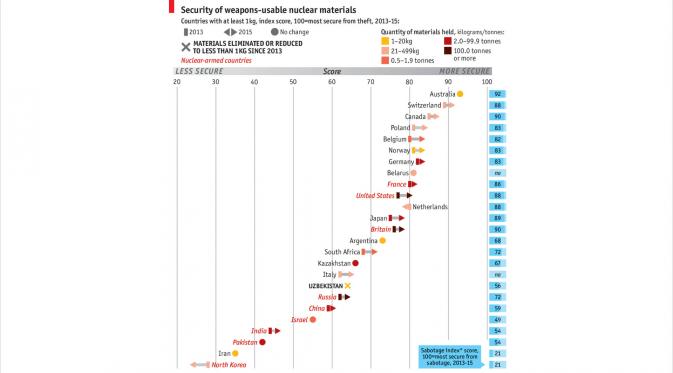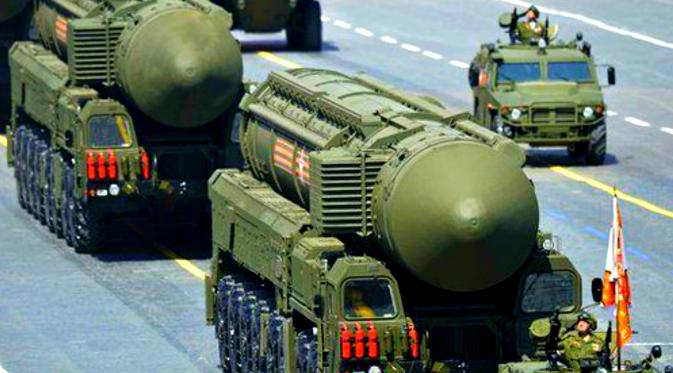Liputan6.com, Jakarta Indonesia is currently looking into the possibility of developing its own nuclear energy power plant facility to better accommodate the general population’s growing needs for electricity which has become scarce following the depletion of fossil fuels as time progresses.
Many have come to argue that the presence of nuclear power plant site also heightens the possibility of having unexpected leakage and financial problem due to relatively expensive maintenance cost. Some argue paradoxical view, calling such as progress in the field of the archipelago state’s infrastructure development.
There is actually another aspect that ought to be considered in the case of nuclear energy. Countries possessing nuclear energy materials, including those who have materials powerful enough to be considered as weapons that, have expressed their worry over likeliness of nuclear materials falling into the wrong hands.
Advertisement
This is primarily because considerably high cost and leakage are not the only concerns and it has expanded to the fear of encountering virtually done cyber-attacks. In spite of the fact that the United Nations nuclear watchdog has formally announced early this January that Iran had come to terms with the a deal agreed last July to disable the country’s nuclear weapons program which the U.S secretary of state John Kerry hailed as “the first day of a safer world”, it does not fully assure that the materials are secure from thefts, extremists and other type of criminals whose parochial interest can be as grandiose of a country’s government, as cited in Reuters.
The agreement in July suggested that Iran decommission reactors that could be exploited to produce weapons-grade plutonium and for them to reduce its stockpile of low-enriched uranium which can power up to weapons-grade material. That may be a fairly productive counter-proliferation method, but it does not lessen the possibility of being outsmarted by those who are willing to steal it.
According to the Economist, international nuclear security summits are held every two years since 2010 to oversee possibility of sabotage in the nuclear materials through cyber attack. The next summit is due to occur in Washington DC in March 2016.

According to the index above provided by The Economist Intelligence Unit, several countries are highly susceptible to cyber attack form of sabotage in terms of their nuclear materials. Doubts were raised at a global scale as to whether or not progress has been made in reducing the number of nuclear stockpiles in countries that have been enlisted for possession. Instead of experiencing reduction, several countries have instead increase the number of their nuclear stockpile and those countries include India, Japan, Netherlands, North Korea, Pakistan and Britain.
* Follow Official WhatsApp Channel Liputan6.com untuk mendapatkan berita-berita terkini dengan mengklik tautan ini.
Easy to Hack
Citing from BBC.com, Russian President Vladimir Putin has announced last year that his country “will put more than 40 new intercontinental ballistic missiles into the service” as part of a wide-reaching program to modernize the country’s military capability.

With more countries stockpiling their nuclear arsenals and warheads, it ultimately contributes to the enduring fear of those materials falling into the wrong hands as supply is abundant and keeping track or intensive monitoring is sometimes difficult.
Advertisement
A report by security think-thank chatam House written by Caroline Baylon suggests the fact that cyber security is still fairly new to many countries especially in their nuclear industry and therefore the rate of fatality is often neglected, as informed by RussiaToday.
“They are really good at safety and, after 9/11, they’ve got really good at physical security. But they have barely grappled with cyber,” she said, adding the industry suffers from a “culture of denial,” she wrote.
She explained through her report that the increasingly revolutionized digitalization of nuclear facilities by using “relatively easily available technology to trim expenditure” as well as “increasing use of commercial software” have inevitably increase the facility’s vulnerability to hacking attacks.
Unfortunately, hacking has also become easier to conduct and instruments to discover site’s susceptibility have also somewhat become available for purchase.
It has been informed that allowing for nuclear materials to fall into the wrong hands may both voluntarily and involuntarily trigger a devastating incident akin to the one occurring at the Fukushima plant in Japan in 2011 where an earthquake shook the nation and resulted in tsunami and damaging the facility, therefore dangerous leakage.
* Fakta atau Hoaks? Untuk mengetahui kebenaran informasi yang beredar, silakan WhatsApp ke nomor Cek Fakta Liputan6.com 0811 9787 670 hanya dengan ketik kata kunci yang diinginkan.
Advertisement
:strip_icc():format(webp)/kly-media-production/avatars/76348/original/065139500_1470218750-Adanti.JPG)
:strip_icc():format(webp)/kly-media-production/medias/1129743/original/043492000_1454410036-nuclear_site_article.jpg)
:strip_icc():format(webp)/kly-media-production/avatars/198/original/097010400_1469618215-Pororo2.jpg)
:strip_icc():format(webp)/kly-media-production/medias/4819784/original/084107500_1714652214-sri_1.jpg)
:strip_icc():format(webp)/kly-media-production/medias/4769712/original/090432700_1710228685-Snapinsta.app_432329451_3750874921902825_5908123680487129083_n_1080.jpg)
:strip_icc():format(webp)/kly-media-production/medias/4820086/original/052090700_1714670345-16_000_34QN9ME.jpg)
:strip_icc():format(webp)/kly-media-production/medias/4808307/original/029410000_1713723424-000_34PX86R.jpg)
:strip_icc():format(webp)/kly-media-production/medias/4820103/original/093849500_1714674962-20240502-Indonesia_U-23_vs_Irak-AFP_1.jpg)
:strip_icc():format(webp)/kly-media-production/medias/4820100/original/089246800_1714673778-25_000_34QQ8FP.jpg)
:strip_icc():format(webp)/kly-media-production/medias/4305859/original/029130800_1674890655-Gaya_Selebrasi_Jonatan_Christie_Saat_Pastikan_Melaju_ke_Final_Indonesia_Masters_2023-AP-3.jpg)
:strip_icc():format(webp)/kly-media-production/medias/3233318/original/024054900_1599649770-Thomas-Uber-Cup-Trophies-e1582168768804.jpg)
:strip_icc():format(webp)/kly-media-production/medias/4818728/original/021747900_1714569034-WhatsApp_Image_2024-05-01_at_19.33.48.jpeg)
:strip_icc():format(webp)/kly-media-production/medias/4816093/original/001754000_1714371293-WhatsApp_Image_2024-04-29_at_12.52.02_PM.jpeg)
:strip_icc():format(webp)/kly-media-production/medias/4816132/original/096311100_1714372823-WhatsApp_Image_2024-04-29_at_12.05.47_PM.jpeg)
:strip_icc():format(webp)/kly-media-production/medias/4766878/original/088748300_1709903476-WhatsApp_Image_2024-03-08_at_16.39.26.jpeg)
:strip_icc():format(webp)/kly-media-production/medias/4818753/original/020853500_1714574135-AP24122154183121.jpg)
:strip_icc():format(webp)/kly-media-production/medias/2224889/original/079613800_1527067357-20180523_PBSI_ThomasUberCup_Gregoria4.jpg)
:strip_icc():format(webp)/kly-media-production/medias/4818547/original/037813300_1714550732-WhatsApp_Image_2024-05-01_at_10.01.52_AM.jpeg)
:strip_icc():format(webp)/kly-media-production/medias/4684741/original/071446000_1702454347-20231213-Gregoria-Mariska-Tunjung-Vs-Taiwan_s-Tai-Tzu-ying-AFP-1.jpg)
:strip_icc():format(webp)/kly-media-production/medias/4650900/original/042569900_1700112561-Gregoria_Mariska_Tunjung_KUMAMOTO_MASTERS_2023_JAPAN_R16_13.jpg)
:strip_icc():format(webp)/kly-media-production/medias/4488280/original/002342400_1688293115-20230702BL_BRI_Liga_1_2023-2024_Dewa_United_Vs_Arema_FC_11.jpg)
:strip_icc():format(webp)/kly-media-production/medias/4817543/original/044965600_1714468944-20240430AA_BRI_Liga_1_Persija_Jakarta_Vs_PSIS_Semarang-2_3.JPG)
:strip_icc():format(webp)/kly-media-production/medias/3538569/original/015307700_1629173438-LIGA_BRI_LIGA_1.jpg)
:strip_icc():format(webp)/kly-media-production/medias/4815536/original/077123500_1714310025-Persebaya_vs_Persik_1_Bruno_Moreira_vs_Simen_Lyngbo.jpeg)
:strip_icc():format(webp)/kly-media-production/medias/4106808/original/051626700_1659270452-20220731IY_Persija_Jakarta_vs_Persis_Solo_22.jpg)
:strip_icc():format(webp)/kly-media-production/medias/4792492/original/074234300_1712109433-Paul_Munster_1.jpeg)